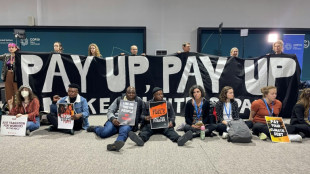
-
 Macron tells Xi he shares desire for 'durable peace' in Ukraine
Macron tells Xi he shares desire for 'durable peace' in Ukraine
-
Ruthless Japan beat China to move to brink of World Cup qualification

-
 French farmers threaten 'chaos' over proposed EU-Mercosur deal
French farmers threaten 'chaos' over proposed EU-Mercosur deal
-
Brazil arrests G20 guards over alleged 2022 Lula assassination plot

-
 China's Xi urges 'strategic' ties in talks with Germany's Scholz
China's Xi urges 'strategic' ties in talks with Germany's Scholz
-
Raducanu gives Britain lead on Slovakia in BJK Cup semis

-
 Russia says Ukraine fired first US-long range missiles
Russia says Ukraine fired first US-long range missiles
-
COP29 negotiators strive for deal after G20 'marching orders'

-
 Walmart lifts full-year forecast after strong Q3
Walmart lifts full-year forecast after strong Q3
-
British farmers protest in London over inheritance tax change

-
 NATO holds large Arctic exercises in Russia's backyard
NATO holds large Arctic exercises in Russia's backyard
-
Trouble brews in India's Manipur state

-
 Son of Norwegian princess arrested on suspicion of rape
Son of Norwegian princess arrested on suspicion of rape
-
Romanian court says 'irregularities' in influencer Andrew Tate's indictment

-
 Iran faces fresh censure over lack of cooperation at UN nuclear meeting
Iran faces fresh censure over lack of cooperation at UN nuclear meeting
-
Despondency and defiance as 45 Hong Kong campaigners jailed

-
 Scholar, lawmakers and journalist among Hong Kongers jailed
Scholar, lawmakers and journalist among Hong Kongers jailed
-
European stocks slide on fears of Russia-Ukraine escalation

-
 Police break up Georgia vote protest as president mounts court challenge
Police break up Georgia vote protest as president mounts court challenge
-
Spain royals visit flood epicentre after chaotic trip

-
 France's Gisele Pelicot says 'macho' society must change attitude on rape
France's Gisele Pelicot says 'macho' society must change attitude on rape
-
G20 leaders talk climate, wars -- and brace for Trump's return

-
 US lawmaker accuses Azerbaijan in near 'assault' at COP29
US lawmaker accuses Azerbaijan in near 'assault' at COP29
-
Tuchel's England have 'tools' to win World Cup, says Carsley

-
 Federer hails 'historic' Nadal ahead of imminent retirement
Federer hails 'historic' Nadal ahead of imminent retirement
-
Ukraine vows no surrender, Kremlin issues nuke threat on 1,000th day of war

-
 Novo Nordisk's obesity drug Wegovy goes on sale in China
Novo Nordisk's obesity drug Wegovy goes on sale in China
-
Spain royals to visit flood epicentre after chaotic trip: media

-
 French farmers step up protests against EU-Mercosur deal
French farmers step up protests against EU-Mercosur deal
-
Rose says Europe Ryder Cup stars play 'for the badge' not money

-
 Negotiators seek to break COP29 impasse after G20 'marching orders'
Negotiators seek to break COP29 impasse after G20 'marching orders'
-
Burst dike leaves Filipino farmers under water

-
 Markets rally after US bounce as Nvidia comes into focus
Markets rally after US bounce as Nvidia comes into focus
-
Crisis-hit Thyssenkrupp books another hefty annual loss

-
 US envoy in Lebanon for talks on halting Israel-Hezbollah war
US envoy in Lebanon for talks on halting Israel-Hezbollah war
-
India to send 5,000 extra troops to quell Manipur unrest

-
 Sex, drugs and gritty reality on Prague's underworld tours
Sex, drugs and gritty reality on Prague's underworld tours
-
Farmers descend on London to overturn inheritance tax change

-
 Clippers upset Warriors, Lillard saves Bucks
Clippers upset Warriors, Lillard saves Bucks
-
Acquitted 'Hong Kong 47' defendant sees freedom as responsibility

-
 Floods strike thousands of houses in northern Philippines
Floods strike thousands of houses in northern Philippines
-
Illegal farm fires fuel Indian capital's smog misery

-
 SpaceX set for Starship's next flight, Trump expected to attend
SpaceX set for Starship's next flight, Trump expected to attend
-
Texans cruise as Cowboys crisis deepens

-
 Do the Donald! Trump dance takes US sport by storm
Do the Donald! Trump dance takes US sport by storm
-
Home hero Cameron Smith desperate for first win of 2024 at Australian PGA

-
 Team Trump assails Biden decision on missiles for Ukraine
Team Trump assails Biden decision on missiles for Ukraine
-
Hong Kong court jails 45 democracy campaigners on subversion charges

-
 Several children injured in car crash at central China school
Several children injured in car crash at central China school
-
Urban mosquito sparks malaria surge in East Africa


Tech firms struggle as Israel-Gaza falsehoods explode
From fake accounts impersonating journalists to war-themed video games fueling false narratives, tech platforms are struggling to contain a tsunami of misinformation around Palestinian-Israeli hostilities after rolling back content moderation policies.
While major world events typically trigger a deluge of falsehoods, researchers say the scale and speed with which misinformation proliferated online following the weekend's deadly assault on Israel by the Palestinian militant group Hamas was unlike ever before.
The conflict, experts say, offers a grim case study of the diminished ability of prominent platforms such as Meta-owned Facebook and X, formerly known as Twitter, to combat false information in a climate of layoffs and cost-cutting that have gutted trust and safety teams.
Aggravating the problem on the Elon Musk-owned X, in particular, are a slew of contentious measures such as the restoration of accounts pushing bogus conspiracies and an ad revenue sharing program with content creators that researchers say incentivizes engagement instead of accuracy.
Experts fear these moves have increased the risk of misinformation provoking real-world harm, amplifying hate and violence especially in a fast-evolving crisis scenario such as the one unfolding in Israel and Gaza.
"Social media platforms are struggling to keep up with the constant churn of misinformation and incitements to violence," Andy Carvin, from the Atlantic Council's Digital Forensic Research Lab (DFRLab), told AFP.
"It's a trend that's been building for some time now, and it's only gotten worse with layoffs impacting trust and safety teams, hampering their ability to keep up with the chaos.
"And in the case of X, changes to the platform have utterly shattered what was previously one of its greatest strengths -- monitoring breaking news and helping users separate fact from fiction."
- 'Flood of grifters' -
Social media users are being bombarded with fake combat photos, old videos from Syria repurposed to look like they were taken from Gaza, and conflict-themed video game footage being passed off as a scene from a Hamas attack, misinformation researchers say.
An image circulating online purported to show Israeli soldiers captured by Hamas, but AFP factcheckers found the picture was taken in 2022 during a military exercise in Gaza.
AFP factcheckers also found several posts on X, Facebook and TikTok promoted a fake White House document allocating $8 billion in military assistance to Israel.
"The sheer amount of doctored, fake, old videos and images of attacks circulating (online) is making it harder to understand what is going on" in Israel and Gaza, said Alessandro Accorsi, a senior analyst at the Crisis Group think tank.
Accorsi voiced "huge concern" that the misinformation, especially fake images of hostages including children, could stoke violence.
"In crises like terrorist atrocities, wars and natural disasters, people tend to descend on social media platforms for quickly accessible information," Imran Ahmed, chief executive of the Center for Countering Digital Hate, told AFP.
"(But) the flood of grifters spreading lies and hate to garner engagement and followers, combined with algorithms that promote this extreme and disturbing content, is why social media is in fact such a bad place to access reliable information."
- 'Fundamentally broken' -
Making matters worse, tech platforms appear to be abandoning efforts to elevate quality information.
Social media traffic to top news websites from platforms such as Facebook and X has fallen off a cliff over the past year, according to data cited by US media from the research firm Similarweb.
Last week, X stripped headlines from news articles shared by users, with links now appearing only as pictures, a move that experts say could further reduce traffic to news sites.
Musk himself courted harsh criticism when he encouraged his nearly 160 million followers on X to follow two "good" accounts for updates on the war. Both accounts are known purveyors of misinformation.
Musk later deleted his post but not before it racked up millions of views. X did not respond to AFP's request for comment.
"Even though there are still countless talented journalists and researchers continuing to use X to help the public better understand what's going on, the signal-to-noise ratio has become intolerable," said DFRLab's Carvin.
"Its utility as a reliable research and reporting tool is fundamentally broken and may never recover."
burs-ac/caw
J.Gomez--AT



